Spring Blossoms
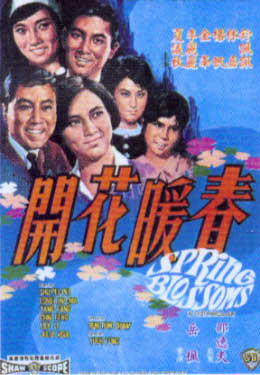
Director: Yueh Fung
Year: 1967
Rating: 5.5
Director Yueh Fung
had some solid successes with a few earlier historical costume dramas such
as “Lotus Lamp”, “Last Woman of Shang” and “Lady General Hua Mu-lan” that
had big sets and bigger stars. He seems less sure of himself though with
this low-key contemporary comedy that sputters much more than it sparks.
The premise has some comedic potential, but the script just has little wit
and doesn’t exploit the comedic or romantic angles that seemed waiting there
to be picked up. A somewhat lesser known cast doesn’t help much either in
adding the oomph that is lacking in the script. Everything just plays out
so slowly that you feel like you are watching jam cross the road.
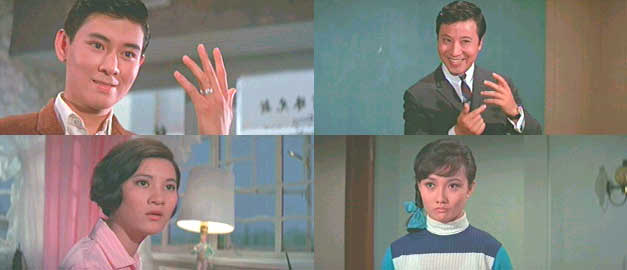
Wu (Yang Fang) and his friend Yao (Chin Feng) are medical students, but are
forced to look for new lodgings when their landlord needs their room. They
decide to get their own separate lodgings and Wu finds an ad for a room in
the Chen household. Living there is a mother and her two daughters, but what
he doesn’t know is that he is falling into a marital trap. Mom uses the room
to lure qualified men to marry off to her daughters and she has successfully
done this three times already! None of the daughters or their husbands make
an appearance other than in photos – but the men are quite recognizable –
Chin Han, Shan Kwan and Yan Jun. Not a bad collection and now she wants to
add one more along with her next in line daughter, Jieyu (Shu Pei-pei).
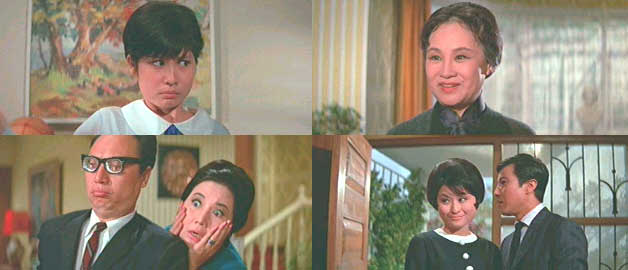
Jieyu wants nothing to do with this family tradition and refuses to even
talk to the new tenant but something about proximity brings out the romantic
in her and soon she is making cow eyes at Wu. Her younger sister, Meiyu (Lily
Li) is doing her best Gidget and trying to match up not only Wu and her sister,
but also her mom to a friend’s father. Lily is the best thing about this
film – cute as a sparkling button and more energy than a romper room of five
year olds. Whenever she is on the screen, it’s easy to simply enjoy her conniving
contrivances and her wide-eyed wonder at everything. Co-incidentally, Yao
(Wu’s friend) finds lodging at Mrs. Chen’s sister (Go Bo Shu) and her husband’s
(Cheung Kwong-chiu). The sister has decided to take a page out of the family
book and rent a room so that she can marry off her 22-year old daughter,
Jinglan (Essie Lin Chia), but Jinglan really wants nothing to do with the
goofy Yao. This feels like a perfect set-up for a Cathay type family comedy
with equal doses of light comedy and heart, but it never clicks.
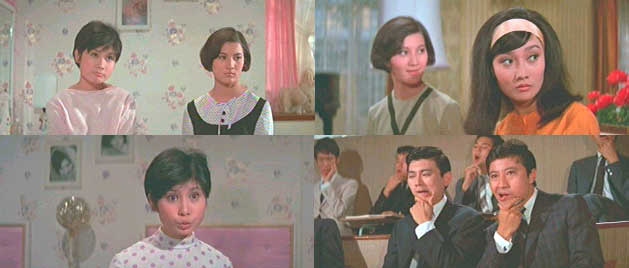
The film does star three young actresses, but interestingly the two to receive
top billing – Essie and Pei-pei never became big stars, while Lily went on
to a long (and occasionally still going) career. Born in 1950, Lily began
training with the Shaws at the tender age of twelve and signed a contract
with them in 1966. Only seventeen at the time this was made in 1967, she
hadn’t become the kung fu star that she was going to become within a few
years – here she looks like she would be handier dealing with dirty dishes
than sharp swords – but she is a delight.
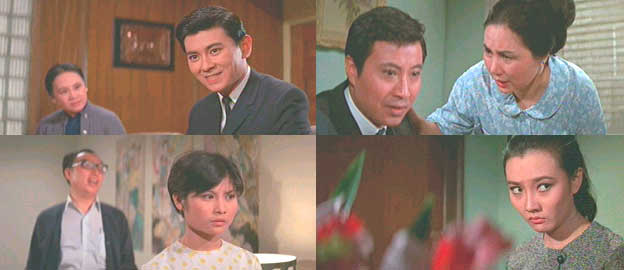
Essie Lin Chia was only three years older than Lily at the time, but seems
much more mature – quite sexy actually with her Gene Tierney cheekbones and
deep set eyes. She signed with the Shaw Brothers in 1964 but never rose above
being a solid supporting actress in a number of films – “Return of the One-Armed
Swordsman”, “Love Without End” (the Jenny Hu version), “The Singing Thief”,
“Unfinished Melody” and others. She ably played various types from sympathetic
best friend to criminal wife to the sadistic “Thousand Hand Lady”. In the
early 1970’s perhaps Shaw and her saw this as a bad fit and she left them
to work in Taiwan and on at least two American films, “Black Samurai”(1976)
and “The Doomsday Machine” (1972).
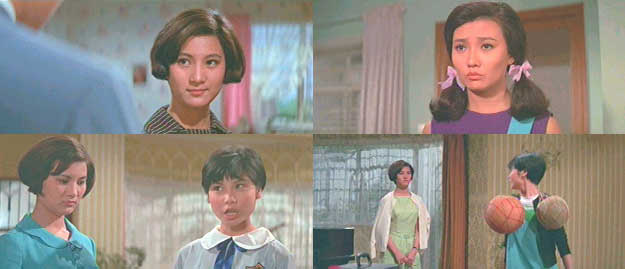
Shu Pei-pei was born in Shanghai in 1948 and later came to Hong Kong. She
was the runner-up at the “Miss Seiko Beauty Contest” and this led to a five-year
contract at Shaws. Though she had ballet and musical training, the majority
of films she performed in were of the wuxia variety – her debut was in the
Cheng Pei-pei film “Thundering Sword” and certainly that Pei-pei knew about
converting from dance to martial arts. Shu Pei-pei left Shaws when her contract
ran out in 1973 and got married, had a child and began working at a travel
agency!






